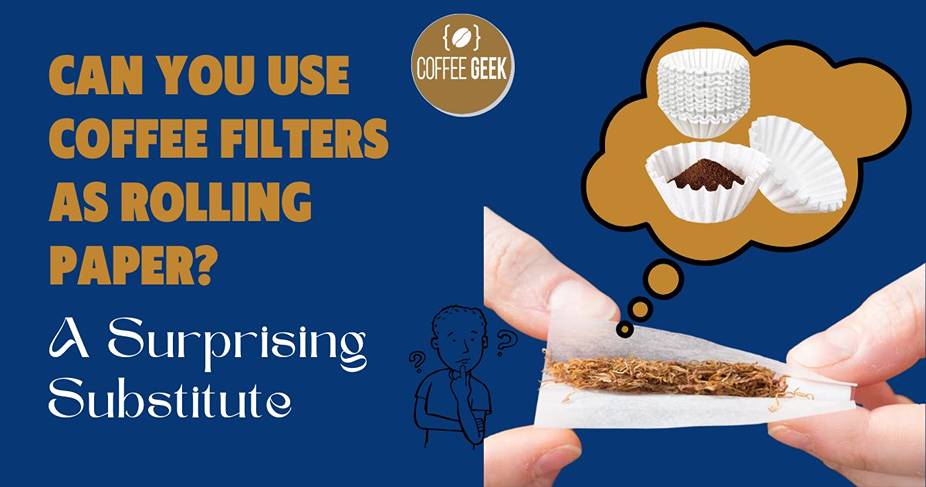Rolling papers are an essential part of the smoking experience, providing a medium for your tobacco or other substances to be conveniently and neatly rolled into a cigarette or joint.
With many different types, materials, and brands available on the market, rolling papers have become a staple for smoking enthusiasts globally.
But what if you find yourself without the traditional rolling papers? Can you use coffee filters as rolling paper alternative?
Coffee filters, while seemingly similar in size and shape to rolling papers, have some distinct differences that may make them less suitable for this purpose.
Understanding the qualities that make a good rolling paper and the potential risks associated with using a coffee filter to roll your filters can help you make an informed decision about whether this household item is a viable substitute.
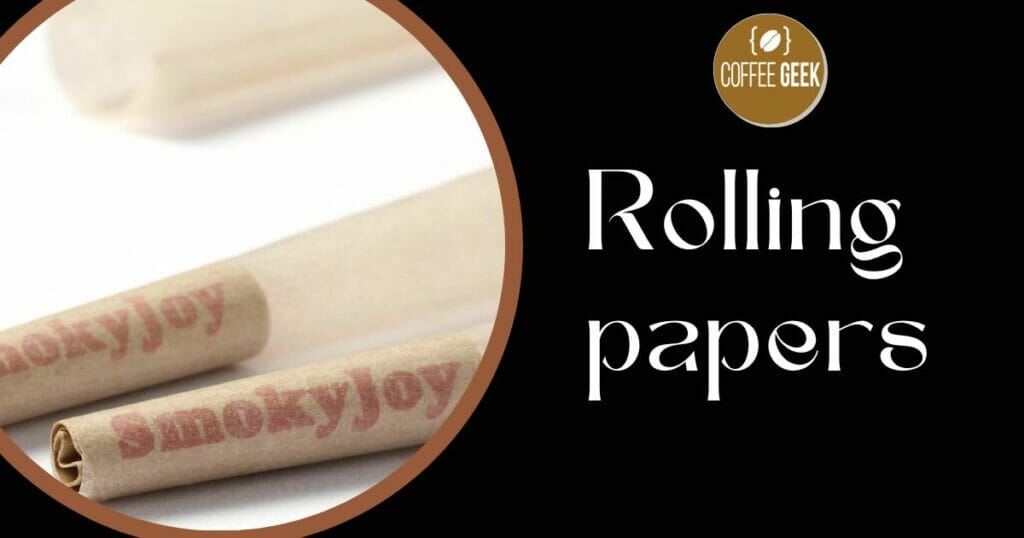
Additionally, it’s crucial to explore alternative materials that can be used safely as rolling paper replacements.
Can You Use Coffee Filters as Rolling Paper – Key Takeaways
- Coffee filters may not be the ideal substitute for rolling papers due to differences in materials and potential health risks.
- It’s essential to understand the purpose of rolling papers and qualities that make a suitable alternative.
- Exploring other alternative materials and methods can lead you to find safe and efficient rolling paper substitutes.
Understanding Rolling Papers and Their Purpose
Rolling papers are thin sheets of paper designed specifically for rolling your own cigarettes, joints, or cigars.
Made from various materials, including rice, wood pulp, flax, or hemp, these papers provide a consistent and even-burning smoking experience.
High-Quality Rolling Papers
Choosing high-quality rolling papers is crucial for your smoking experience.
The materials used in the production of these papers play a key role in the taste, burn rate, and overall enjoyment of your smoke.
Ideally, you should search for papers that consist of all-natural materials, as they tend to burn more evenly and smoothly without unwanted chemicals.
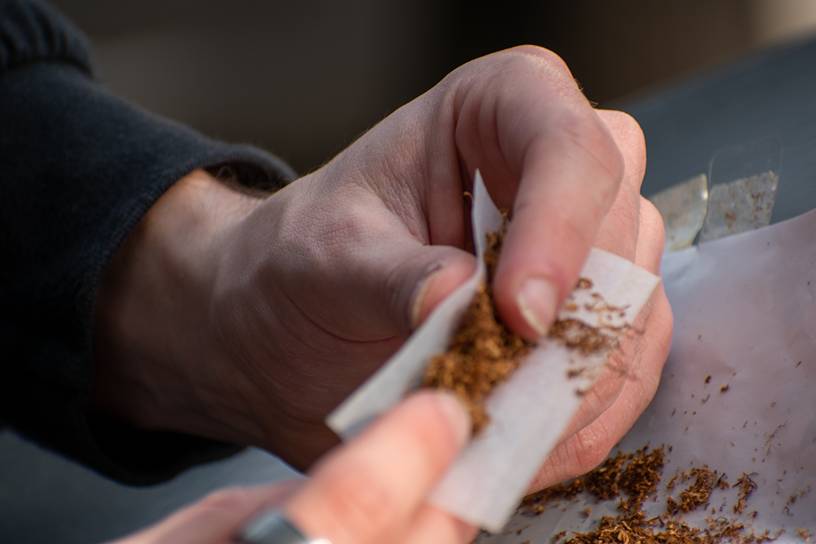
Moreover, pay attention to the thickness of the papers.
Thinner papers often allow for a cleaner, more natural smoke, while thicker papers may add a distinct taste or be more difficult to roll.
Ultimately, the choice boils down to your personal preferences.
Role in the Smoking Experience
Rolling papers serve as the primary medium to effectively hold and burn your tobacco or herbal mixture.
They play a crucial role in determining the taste, smoothness, and burning speed of the tobacco inside your joint or cigarette.
Good quality rolling papers can enhance your smoking experience by providing a smooth, even burn, allowing you to savor the flavors of your chosen blend.
When rolling, it’s essential to ensure that you tightly pack your mixture, as a loose roll may result in an uneven burn and a less satisfying smoking experience.
Additionally, take your time while rolling, as a well-constructed joint or cigarette will ensure the desired outcome.
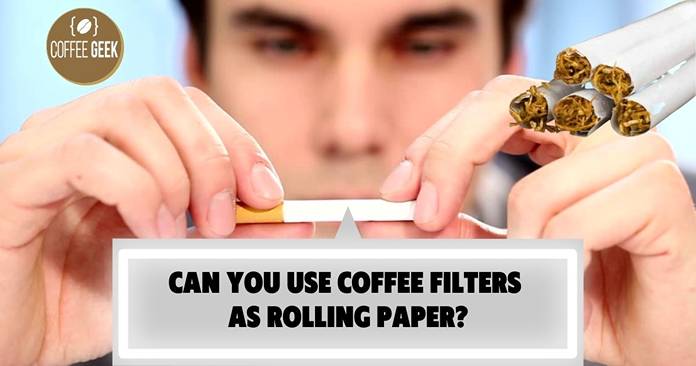
In conclusion, selecting the right rolling papers, along with the proper rolling technique, ensures a satisfying smoking experience.
Explore various materials and thicknesses to find the ideal match for your preferences.
Remember to prioritize high-quality rolling papers and practice your rolling skills to make the most of your smoking sessions.
Coffee Filters as a Substitute for Rolling Papers
Pros and Cons of Using Coffee Filters
While plastic coffee filter may seem like an ideal choice for a convenient alternative to rolling papers, there are both advantages and disadvantages to using them.
Pros:
- The coffee filter is easy to find and readily available in most households.
- They are made from natural paper fibers and are unbleached, making them chemical-free.
Cons:
- Filters are not designed for rolling and can be difficult to work with.
- They burn extremely quickly, risking your joint being engulfed with every hit.
- The paper in the coffee filter contains chemicals different from regular rolling papers, which may be harmful when burned.
Comparing Coffee Filters to Traditional Rolling Papers
In comparison to traditional rolling papers, coffee filters fall short in several aspects.
Size and Texture: Rolling papers are specifically designed for rolling joints and cigarettes, with a fine and smooth texture that allows for easy rolling. Coffee filters, on the other hand, are thicker and coarser, making it challenging to roll a joint.
Burning Properties: Traditional rolling papers burn evenly at a slower rate, providing consistency with each hit. Coffee filter burn quickly and unevenly, creating an unpleasant and potentially hazardous experience.
Health Concerns: Rolling papers are generally made with fewer chemicals than coffee filters, making them a safer option for smoking. Using coffee filters as a substitute may expose you to harmful chemicals when burned.

In conclusion, while you may be tempted to use a coffee filter as a substitute for rolling paper, it’s essential to consider the potential risks and drawbacks of this alternative.
The differences in texture, burning properties harsh chemicals, and health concerns make traditional rolling papers a far more suitable choice for rolling a perfect joint.
Health Concerns and Risks
Chemicals and Toxins in Coffee Filters
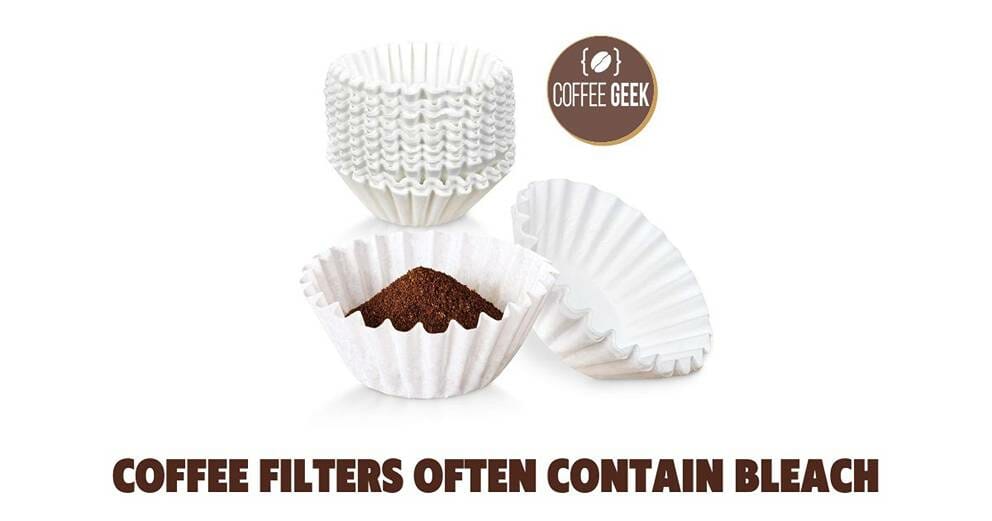
When considering using filters as rolling paper, you must be aware of the potential health concerns. Coffee filters often contain bleach, which can release harmful chemicals when burned.
These filters can also contain trace amounts of dioxins, which are pollutants and carcinogens that can pose serious health risks.
Additionally, burning filters can generate tar and carbon monoxide, which you will inhale along with your smoke.
Implications for Cannabis and Tobacco Consumers
If you’re a cannabis or tobacco consumer, using a coffee filter as rolling paper may lead to unexpected health hazards.
The chemicals, bleach, and potential contaminants in filters may alter the flavor of your smoke and compromise the purity of the substance you’re consuming.
Furthermore, inhaling pollutants like dioxins, tar, and carbon monoxide may exacerbate the risks of cancer and other smoking-related health issues.
To minimize health risks, it’s crucial to opt for proper rolling papers specifically designed for smoking rather than resorting to a coffee filter.
These genuine rolling papers undergo testing for safety and adhere to standards that ensure the lowest possible chemical exposure, making them a much safer choice for your lungs and overall well-being.
Alternative Materials for Rolling Papers
Evaluation of Different Alternatives
There are several alternative materials that can be used in place of traditional rolling papers.
Some of these alternatives include:
- Parchment paper: This unbleached and eco-friendly option is relatively easy to find and can be a cost-effective substitute. However, it may be thicker than typical rolling papers and burn differently.
- Tissue paper: While tissue paper is thin and readily available, it is not recommended for rolling due to its fragility and potential health risks when burned.
- Bible pages: Although some people have used these thin pages in a pinch, it is generally not advised due to the potential disrespect and religious implications.
- Aluminum foil: Definitely aluminum foil is not recommended as a rolling paper alternative, as it may produce harmful fumes when heated.
- Corn husks: A more natural and sustainable alternative to rolling papers, corn husks can be used for a unique smoking experience. However, they may be more difficult to find and roll.
- Rose petals: For a fragrant and visually appealing option, rose petals can also be used as rolling papers. Keep in mind that they might alter the taste of your smoke.
Factors to Consider When Choosing a Substitute
When looking for a substitute for rolling papers, there are a few factors you should consider:
- Availability: Your choice of alternative will depend on what is easily accessible to you. Many of the options listed above can be found in your home, while others may require a bit more effort to locate.
- Health risks: Some alternatives, like tissue paper and aluminum foil, may pose risks to your health when burned. It’s essential to assess the potential risks associated with your choice before deciding on a substitute.
- Ease of use: How easy a material is to handle and roll will impact your overall experience. Alternatives like parchment paper and corn husks may be trickier to roll than traditional rolling papers.
- Taste and aroma: Your chosen alternative may influence the flavor and smell of your smoke. For example, rose petals will provide a floral aroma, while corn husks may offer a more earthy flavor.
In conclusion, while you can use a coffee filter as rolling paper, there are other alternatives to consider that may provide a more effective way enjoyable experience.
Always weigh the pros and cons of each option and choose a rolling paper substitute that best suits your needs.
Frequently Asked Questions
Is it safe to use coffee filters for smoking?
Using coffee filters as rolling papers is not recommended. Coffee filters are made from a different material than conventional rolling papers and may contain different chemicals when burned. Stick to using rolling papers specifically designed for smoking to ensure your safety.
What are alternatives to rolling papers?
There are several alternatives you can consider if you do not have access to rolling papers. Some options include using a pipe, vaporizer, homemade water pipe, or even an apple. These methods can provide a safer and more enjoyable smoking experience than improvising with household materials like coffee filters.
How does the thickness of coffee filters affect burning?
The thickness of the paper coffee filters used can greatly impact the burning process. Coffee filter is typically thicker than rolling papers, which can result in an uneven and difficult-to-maintain burn. Additionally, the thicker material may produce more smoke and potentially harmful byproducts. Using rolling papers specifically designed for smoking will provide a more consistent burn with fewer unwanted effects.
Do filters have chemicals that may be harmful?
While coffee filters are generally safe for their intended purpose of filtering coffee, they may contain chemicals that could be harmful when the filter is burned and inhaled. Traditional rolling papers are made with fewer chemicals than filter used, specifically for the purpose of smoking. For your safety, it is best to avoid using coffee filter as a substitute for rolling papers.
Are there any risks associated with using unconventional rolling papers?
Using unconventional materials like coffee filters as rolling papers can pose several risks. One major risk is inhaling harmful chemicals that may be released when these materials are burned. Additionally, the poor burning characteristics of such materials can lead to an unpleasant and potentially hazardous smoking experience. To minimize risks and ensure a safe smoking experience, always use rolling papers made specifically for smoking.

